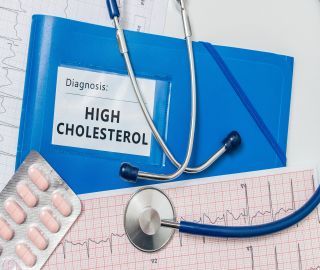Ever wondered why your cholesterol can go up when you’re losing weight?
In a previous article, we discussed the importance of cholesterol for a healthy functioning body but, weight loss can result in an increase in cholesterol.
Many of RMR’s members report that their cholesterol levels have risen during their weight-loss journey. According to Dr. William Davis, author of Wheat Belly, this is not surprising: “When you lose weight, you are mobilizing energy stored as fat. That fat is mobilized as fatty acids and triglycerides into the bloodstream. 10 pounds lost, for instance, means the equivalent of 35,000 calories of fat released into the bloodstream.”
Davis, explains what these fatty acids then do in the body:
“Block insulin – and thereby increase blood sugar. A non-diabetic can even become transiently diabetic during weight loss.
Increase triglycerides – A starting triglyceride level of, say, 120 mg/dl, can increase to 180 mg/dl during active weight loss. (Triglycerides contain fatty acids.)
Decreased HDL – Excess fatty acids and triglycerides modify HDL particles, causing their degradation and elimination. A starting HDL of 45 mg/dl can drop to 28 mg/dl, for example.
LDL measures go haywire – The conventional calculated LDL cholesterol, or even generally superior measures like apoprotein B or NMR LDL particle number, can go in any direction rather unpredictably: They can go up, down, or sideways. Likewise, the (miserably useless) total cholesterol value can go up, down, or sideways.
Increased blood pressure – This is likely due to the enhanced artery constriction that occurs due to increased endothelial dysfunction, i.e., dysfunction of the normal relaxation mechanisms of arteries.”
It is recommended that you don’t do any blood tests until your weight has stabilised for at least a month.
According to Kris Gunnars, it is important to get your cholesterol tested properly so that you know if you really have anything to be worried about. Here are six pointers from Gunnars:
- “If you can, have your doctor measure your LDL-p (LDL particle number)… or ApoB, which is another way of measuring LDL particle number.
- If your LDL cholesterol is high, but your LDL particle number is normal (called discordance), then you probably have nothing to worry about.
- On a low-carb diet, HDL tends to go up and triglycerides down, while Total and LDL cholesterol tend to stay the same. LDL particle size tends to increase, and LDL particle number tends to go down. All good things.
- Within those averages, it appears that a subset of people on a low-carb ketogenic diet DO get a rise in Total cholesterol, LDL cholesterol, and LDL particle number.”
- If it isn’t possible to have these tests done, Non-HDL cholesterol (Total Cholesterol – HDL) is a fairly accurate marker that can be measured on a standard lipid panel.
- “If your Non-HDL is elevated, then that is reason enough to take measures to try to get it down.”
Suggestions from Kris Gunnars to bring down cholesterol if you are part of the small percentage of people whose so called “bad cholesterol” (i.e small-dense LDL particle numbers) has been increased while Banting:
- Remove bullet coffee from your diet – Kris is of the opinion that this alone may be sufficient to solve the problem.
- Replace some saturated fats with monounsaturated fats – cook with olive oil instead of butter and coconut oil. He suggests eating more nuts and avos too.
- Kris can’t emphasize olive oil enough: quality extra virgin olive oil has many other benefits for heart health that go way beyond cholesterol levels. It protects the LDL particles from oxidation, reduces inflammation, improves the function of the endothelium and may even lower blood pressure
- Kris says it is also important to eat fatty fish that is high in Omega-3 fatty acids, at least once per week. If you can’t or won’t eat fish, supplement with fish oil instead.
- It is possible that some individuals see cholesterol increases when they’re in ketosis, but improve when they eat just enough carbs to avoid going into ketosis, according to Kris
- Kris believes that exercising, getting better sleep and minimizing stress levels can also help.
In conclusion, although cholesterol is essential for a healthy, functioning body, weight loss can result in an increase. Gunnars recommends you wait until your weight has stabilised before doing any tests to see if there is any concern. A small portion of people can see a rise in “bad cholesterol” on a low-carb diet, but it is important to rule out other factors like thyroid function and Familial Hypercholesterolemia. It’s essential to do the right cholesterol tests and that your doctor understands what to look for.


